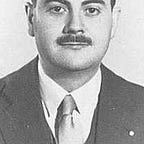He was 41 years old. He had a contagious smile and a peaceful face. It was the winter of 1962 in Buenos Aires. That man was dying of a terrible and incurable cancer in a hospital bed. Those perhaps were his last days. No one knew. He needed fast! a massive transfusion to continue living. Hundreds of workers were standing outside the hospital lining up to donate blood. A sight to see! The clinic staff did not understand anything of what was happening. They thought he was a union leader because there were countless overalls. But no, the young patient in that bed was the CEO of a large industrial company that employed 3,000 people, many of whom were about to donate their blood to the boss. A year before that company was sold to a US trust fund that decided to lay off 1,200 people. Silently enduring advanced cancer, that dying boss born in the Argentinean élite, got on a plane, flew to the United States, and strongly opposed the layoffs.
He did not go neither return empty-handed. A man of great resources, creativity and innovation, he proposed a recovery plan that consisted of retaining all the workers. He got it. No one was fired.
Active life offers us, if we want, a magnificent opportunity to see ourselves, to surprise our qualities and moreover our defects.
From a very young age Enrique Shaw wanted to improve the critical situation of employment and workers. For this, he promoted advanced labor laws in Argentina and South America. He knew that to do so he had to set and be the example. He spent many hours thinking about what the roles of business executives should be. He discovered at least three that he applied consistently, joyfully and vigorously. First and foremost, service to others and the community in all the carried out activities. Second, the development of people to lead technological innovation and thus increase their creativity and prevent material waste (sustainable development). Finally, a deep sense of humanity, to do whatever it takes to help each individual’s personality flourish.
Enrique, a practical and concrete man, also knew that this would increase the effectiveness and efficiency of the company’s processes and products leveraging the talents, gifts and abilities that each of us as human beings received at birth. Because he understood some are exceptionally gifted and others have to be content with very little, but we all have the universal duty to make the most of our talent. He often recall the words of Mr. Stanley Teele, Dean of Harvard Business School: “The key reason for so many unproductive people lie in the brutal fact that they hate their jobs”.»
As a leader, he had to keep employees from hating their jobs, had to stay productive and take full advantage of the diversity of skills each of them had.
Productivity is nothing more than an open door for workers to develop their personality and fulfill the mission in life for which they were created.
Back then there were many definitions of the concept of collective work. Intellectuals, scientists and business leaders had not yet reached a common definition of what productivity was. What he was very clear about is that work is not an end, neither is production or well-being. For him, productivity was a stage of personal perfection, the human being had been created to fulfill his destiny and the workers would be satisfied if they knew that their work was the instrument to fulfill their task and also their mission in the world.
So, according to Enrique, we don’t have to do more to be outstanding executives. We just have to do better. How? These are the requirements to fulfill that innovative mission:
Be a person deserving authority: Whoever exercises authority should honor it.
Be involved in business: this person should be an entrepreneur, an inspiring, diligent, cheerful person. Grumblers have never gone far.
Be self-controlled: Cato, the severe Roman consul, briefly said: “The worst ruler is the one that cannot master himself”.
Be wise: There is always a technique to implement an action. The famous Hawthorne experiments and other similar tests on “fatigue” and “wish to help” ratify the importance of intelligence to study and identify the right psychological technique to meet any goal, even extremely sound ideals.
Be sympathetic: identifying problems is not enough, we should also understand them.
Be kind: having an understanding heart is primarily applicable to “listening”, being gentle, above all means paying attention, comprehend, focusing on understanding others.
Enrique knew all the employees by name, was deeply concerned about their families and developed a very personal relationship with them. In the final moments of his life he declared: “I can finally say with joy that the blood of workers runs in my veins”.
On August 27th 1962 he died at 41 years of age. He could become the first businessman saint in the history of the Catholic Church.
